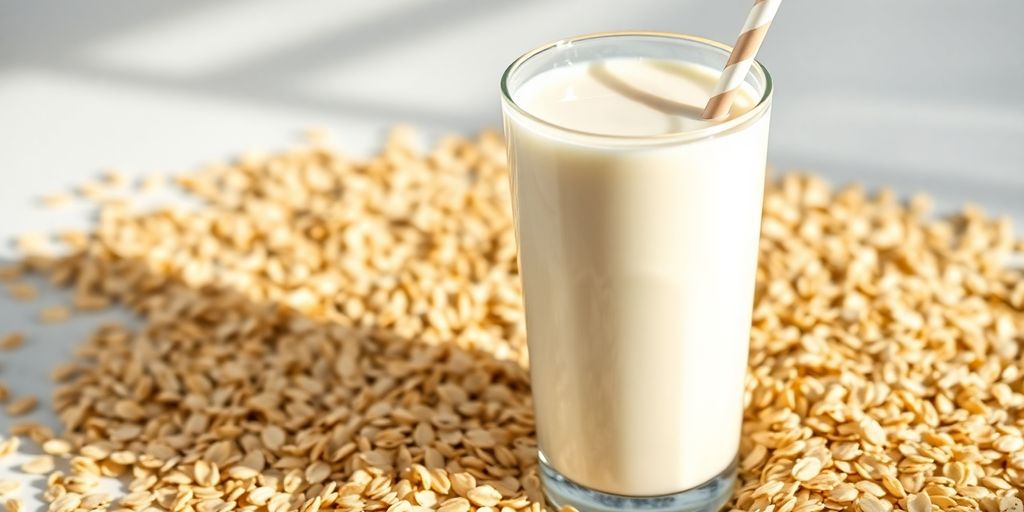So, you’ve been seeing oat milk everywhere, right? From your morning coffee to your cereal bowl, it’s popped up as a popular choice. But is this trendy drink really all it’s cracked up to be, especially when we’re talking about healthy oat milk? We’re here to break down what’s actually in it, what to look for on the labels here in Australia, and whether it’s a good swap for your usual milk. Let’s get into it.
Key Takeaways
- Oat milk is mostly oats and water, but it’s often fortified with vitamins and minerals like calcium and vitamin D to boost its nutritional value.
- When buying oat milk in Australia, always check the label for calcium content, aiming for around 120mg per 100mL, and look out for ‘no added sugar’ claims.
- While oat milk offers benefits like beta-glucan for heart health and is lower in saturated fat, it doesn’t pack the same protein punch as cow’s milk.
- Oat milk isn’t a suitable full replacement for cow’s milk for young children and can be a concern for those with gluten intolerance due to potential cross-contamination.
- Choosing oat milk can be a more ethical and sustainable option compared to dairy, as it avoids animal products and generally has a lower environmental impact.
Understanding Healthy Oat Milk: What’s Inside?

So, you’re curious about oat milk, eh? It’s popped up everywhere, from your local cafe to the supermarket shelves. But what exactly are you pouring into your morning coffee or cereal? Let’s break down what goes into a typical carton of oat milk, especially the ones you’ll find here in Australia.
The Basic Blend: Oats and Water
At its core, oat milk is pretty simple. It’s basically oats blended with water. The oats are usually soaked, then blended, and the liquid is strained out. Think of it like making a really milky oat porridge, but then you strain out most of the solids. This means that while oats are the main ingredient, they don’t make up a huge percentage of the final product – often around 10% or so. This is why some people reckon it should be called ‘oat water’ rather than ‘oat milk’.
Fortification: Essential Vitamins and Minerals
Because the basic oat and water mix isn’t exactly a nutritional powerhouse on its own, many Australian brands fortify their oat milk. This means they add back in nutrients that might be lost or are naturally low in oats. You’ll often see calcium and Vitamin D added, which are important if you’re using oat milk as a replacement for dairy. Some might also have added B vitamins or Vitamin A. It’s always worth checking the label to see what’s been added, as this can make a big difference to its nutritional profile.
Oat Milk vs. Cow’s Milk: A Nutritional Snapshot
When you stack oat milk up against traditional cow’s milk, there are some clear differences. Cow’s milk generally has more protein and naturally contains calcium and other vitamins. Oat milk, on the other hand, is typically lower in saturated fat and is cholesterol-free. It also boasts beta-glucan, a type of soluble fibre found in oats that’s good for your heart. However, if you’re looking for a direct nutritional swap, especially for growing kids, oat milk often falls short unless it’s heavily fortified. It’s definitely not a complete substitute for young children who rely on milk for development.
Here’s a quick look at how they generally compare per cup (250ml):
| Nutrient | Cow’s Milk (Full Cream) | Oat Milk (Typical Fortified) |
|---|---|---|
| Calories | ~150 | ~120 |
| Protein | ~8g | ~2-3g |
| Calcium | ~300mg | ~300mg (if fortified) |
| Saturated Fat | ~5g | ~0.5g |
| Fibre (Beta-glucan) | 0g | ~2-4g |
Remember, these are general figures. Always check the specific brand’s nutrition information panel as formulations can vary quite a bit.
Navigating Oat Milk Labels in Australia
When you’re standing in the supermarket aisle, faced with a wall of oat milk cartons, it can feel a bit overwhelming. But don’t worry, figuring out what’s what is pretty straightforward once you know what to look for. Reading the label is your best bet for choosing a healthy option.
Key Nutrients to Look For
Most oat milks are fortified, meaning vitamins and minerals are added to boost their nutritional value. While oats themselves have good stuff in them, the milk version often needs a little help to match the nutrient profile of cow’s milk. Keep an eye out for:
- Calcium: This is a big one, especially if you’re using oat milk as a dairy alternative. Many brands add calcium to make them more comparable to cow’s milk.
- Vitamin D: Often added alongside calcium, as it helps your body absorb calcium.
- Vitamin B12: Important for nerve function and energy production, and often lacking in plant-based diets.
- Iodine: A mineral that plays a role in thyroid function.
Calcium Content: A Crucial Check
Because oats aren’t naturally high in calcium, many oat milks are fortified to provide a decent amount. You’ll want to compare the calcium content per 100mL. For example, some brands might offer around 120mg of calcium per 100mL, which is a good amount. Others might have less, so it’s worth checking if you’re relying on oat milk for your calcium intake. It’s a good idea to check out allergen information on food labels to understand what’s in your food.
Decoding ‘No Added Sugar’ Claims
This is a common claim you’ll see, and it’s generally a good sign. It means the manufacturer hasn’t added extra sugars like sucrose or glucose. However, it’s still worth checking the ingredients list. Sometimes, oats themselves can contribute a natural sweetness, and some brands might use other ingredients that can add up. Look for oat milks where the primary ingredients are simply oats and water, with minimal other additions.
When you’re comparing, think about what you’ll be using the oat milk for. If it’s for your morning coffee, a barista blend might be worth the extra cost. If it’s for cereal or just drinking, a standard unsweetened version is likely fine. It’s all about finding what works for your taste and your needs.
Top Healthy Oat Milk Brands Down Under
So, you’re keen to try oat milk, but the supermarket shelves are looking a bit overwhelming? It’s true, there are heaps of options these days, and figuring out which one is actually good for you can feel like a mission. We’ve done some digging to help you sort through the popular supermarket choices, the fancy barista blends, and the organic, no-added-sugar varieties.
Popular Supermarket Choices
When you’re just grabbing your weekly shop, you’ll find a few familiar names. These are generally the most accessible and often the most budget-friendly. Keep an eye out for brands that are fortified with calcium, as this is something oat milk often lacks naturally compared to dairy milk. Some good ones to look for include:
- Sanitarium So Good Oat No Added Sugar
- Vitasoy Oat Milky
- Chobani Oatmilk Original
It’s worth checking the labels, though, as fortification levels can vary. We found that many of these options aim for around 120mg of calcium per 100mL, which is a decent amount.
Barista-Style Oat Milks Reviewed
If you’re a coffee lover, you’ve probably noticed the rise of ‘barista’ oat milks. These are designed to froth and steam well, giving you that cafe-quality coffee at home. They tend to be a bit creamier and thicker. Some popular picks that performed well in our taste tests include:
- Oatly Oat Milk Barista Edition
- Minor Figures Barista Oat
- Sanitarium So Good Barista Oat
These often have a slightly richer flavour profile, which works wonders in a latte or flat white. Just remember, ‘barista’ doesn’t automatically mean ‘healthiest’ – always check the sugar content and fortification.
Organic and Unsweetened Options
For those who prefer to keep things simple and natural, there are plenty of organic and unsweetened oat milks available. These are great if you want to avoid added sugars and artificial ingredients. Some standouts include:
- Coles Organic Oat Milk Unsweetened
- Pureharvest Organic Oat Unsweetened
- Oatly Organic Oat Milk
These often have a more subtle oat flavour. We found that Nimbus Oat Milk is another great all-natural option, using avocado oil and being packed with calcium.
When choosing an oat milk, think about what you’ll be using it for. If it’s for your morning coffee, a barista blend might be best. If it’s for cereal or smoothies, an unsweetened version could be ideal. Always compare the nutrition panels, especially for calcium and added sugars.
Health Benefits of Oat Milk

So, you’re curious about what makes oat milk a bit of a health star? Well, it’s not just about being a trendy dairy alternative. There are some genuine benefits to consider, especially if you’re looking to tweak your diet.
The Power of Beta-Glucan
Oats are famous for a type of soluble fibre called beta-glucan, and oat milk carries this goodness along for the ride. This fibre is pretty special because it can help manage your cholesterol levels. Studies have shown that regularly sipping on oat milk can lead to a reduction in both total and ‘bad’ LDL cholesterol. It’s thought that beta-glucan forms a gel in your gut, which then binds to cholesterol and helps remove it from your body. Plus, it might even help you feel fuller for longer and keep your blood sugar levels more stable after meals. If you’re keen on boosting your fibre intake, oat milk can contribute, though eating whole oats like porridge is still a top way to get your fill.
Lower in Saturated Fat
Compared to regular cow’s milk, most oat milks are noticeably lower in saturated fat. This can be a good thing if you’re trying to cut down on the types of fats that aren’t great for your heart. It’s one of the reasons people reach for oat milk when they want something creamy but lighter. Just remember, while it’s lower in saturated fat, it’s also lower in protein and naturally lower in calcium than cow’s milk, so keep that in mind if you’re relying on it as a primary milk source.
Cholesterol-Free Alternative
This one’s pretty straightforward: oat milk contains zero cholesterol. Since cholesterol is only found in animal products, any plant-based milk will be cholesterol-free. This makes it a good option for anyone looking to reduce their dietary cholesterol intake. It’s a simple swap that can fit into a heart-conscious eating plan.
While oat milk offers some neat health perks, especially with its beta-glucan content and lower saturated fat, it’s not a perfect nutritional clone of cow’s milk. Always check the label for fortification and consider your overall diet when making the switch.
Here’s a quick look at how it stacks up:
| Nutrient | Oat Milk (approx.) | Cow’s Milk (approx.) |
|---|---|---|
| Saturated Fat | Low | Moderate |
| Cholesterol | 0mg | 24mg |
| Beta-Glucan | Present | Absent |
| Protein | Low | High |
| Calcium | Varies (fortified) | High |
Considerations Before Switching to Oat Milk
So, you’re thinking about making the switch to oat milk? It’s a popular choice these days, and for good reason. But before you ditch the dairy for good, there are a few things worth mulling over to make sure it’s the right move for you and your family.
Not a Complete Substitute for Young Children
While oat milk can be a tasty alternative, it’s not quite the same as cow’s milk when it comes to nutrition, especially for little ones. Cow’s milk is packed with protein and calcium, which are super important for growing bodies. Oat milk, on the other hand, naturally has less of these. Some brands do add extra calcium and vitamins, which is great, but it still might not tick all the boxes for a young child’s complete nutritional needs. It’s generally not recommended as a full replacement for cow’s milk for children under five. Always chat with a health professional before making big changes to a child’s diet.
Potential Gluten Cross-Contamination
This is a big one if you or someone in your household has coeliac disease or a gluten sensitivity. Oats themselves are naturally gluten-free, but they can often get contaminated with gluten during growing or processing. This means that even if the oat milk packaging says ‘gluten-free’, there’s a small chance it might still contain traces of gluten. If you need to avoid gluten strictly, it’s best to look for brands that are certified gluten-free and have really clear labelling about their processing.
Consulting a Dietitian for Personalised Advice
Making dietary changes can be a bit tricky, and what works for one person might not work for another. If you’re swapping out milk for health reasons, like managing cholesterol or a dairy intolerance, or if you’re just unsure about how oat milk fits into your overall diet, talking to a dietitian is a really good idea. They can help you:
- Understand the nutritional differences between oat milk and other milks.
- Check if the oat milk you’re choosing is fortified with the right nutrients.
- Make sure you’re still getting all the vitamins and minerals your body needs.
- Offer advice on specific brands or how to incorporate oat milk into balanced meals.
Making informed choices about your diet is always a good thing. While oat milk has a lot going for it, like its environmental benefits and creamy texture, it’s important to weigh up the pros and cons for your individual situation. Don’t be afraid to seek professional guidance to ensure you’re making the best choices for your health and well-being.
Ethical and Sustainable Oat Milk Choices
When you’re picking out your oat milk, it’s not just about what’s in the carton for your morning coffee or cereal. Lots of folks are thinking more about where their food comes from and how it’s made, and that’s totally fair. For many, the ethical side of things is a big deal, especially when you compare plant-based options to traditional dairy.
Animal Welfare in Dairy Production
It’s no secret that the dairy industry has faced scrutiny regarding animal welfare. Concerns often centre on the separation of calves from their mothers shortly after birth so that the milk can be collected for human consumption. Some studies even suggest that the demands of milk production can be harder on cows than meat production. If this is something that bothers you, then oat milk is a clear winner. As it’s made from oats and water, no animals are involved in its production, meaning no ethical dilemmas on that front.
Oat Milk’s Environmental Footprint
Beyond animal welfare, the environmental impact of our food choices is a growing consideration. Dairy farming, in particular, contributes significantly to greenhouse gas emissions and uses a lot of water. Oat milk, on the other hand, generally has a much smaller environmental footprint. Studies show it produces considerably fewer emissions and uses significantly less water compared to cow’s milk. In fact, when you look at all the plant-based milk alternatives out there, oat milk often comes out on top for its low impact on the environment.
Here’s a quick look at how oat milk stacks up against cow’s milk:
| Factor | Oat Milk (Approx.) | Cow’s Milk (Approx.) |
|---|---|---|
| Greenhouse Gas Emissions | 80% less | Baseline |
| Water Usage | 10x less | Baseline |
Finding Brands Aligned with Your Values
So, how do you find an oat milk brand that matches your ethical and environmental standards? It often comes down to a bit of detective work. Look for brands that are transparent about their sourcing and production methods. Some companies are really pushing for sustainable farming practices, using renewable energy, and minimising waste. It’s worth checking out brand websites or even giving them a shout on social media to ask about their practices. You might find that some brands are certified organic, which often means they adhere to stricter environmental standards. While it might take a little extra effort, choosing a brand that aligns with your values can make your oat milk habit feel even better.
Making the switch to oat milk can be a positive step for both animal welfare and the environment. It’s about making informed choices that feel right for you and the planet.
So, is Oat Milk Worth the Fuss?
Look, oat milk has definitely earned its spot in Aussie cafes and kitchens. It’s a decent choice if you’re ditching dairy, whether that’s for ethical reasons, allergies, or just because you fancy something different. Just remember, it’s not quite the nutritional powerhouse that cow’s milk is, so keep an eye out for those calcium-fortified options to make sure you’re getting what your body needs. If you’re unsure, having a chat with a dietitian can really help you figure out if oat milk fits into your diet the best way possible. Ultimately, the choice is yours, but knowing the facts helps make that decision a whole lot easier.
Frequently Asked Questions
What exactly is oat milk made from?
Oat milk is generally made by blending oats with water and then straining out the solids. Some brands add extra vitamins and minerals, like calcium and vitamin D, to make it more like cow’s milk nutritionally.
What should I look for on the oat milk label?
When you’re picking out oat milk, definitely check the nutrition label. Look for ones that have calcium added, as oats themselves don’t have much. Things like vitamin D and B12 are also good extras to see.
Is oat milk actually healthy for you?
Oat milk has some good stuff like beta-glucan, which is a fibre that can help with cholesterol. It’s also usually lower in saturated fat and has no cholesterol. However, it doesn’t have as much protein as cow’s milk.
Can I give oat milk to my toddler instead of cow’s milk?
While oat milk is great for adults and older kids, it’s not the best choice as the main milk for children under five. Cow’s milk has more of the fats and proteins that young kids need for growing.
Is oat milk safe for people with gluten intolerance?
If you have coeliac disease or are really sensitive to gluten, you need to be careful. Oats can sometimes get mixed with wheat during growing or processing, so some oat milks might not be totally gluten-free. Always check the label if this is a concern for you.
Why do people say oat milk is better for the environment and animals?
Many people choose oat milk because it’s kinder to the planet, using less water and producing fewer greenhouse gases than dairy milk. Plus, it’s a great option if you prefer not to support animal farming.





